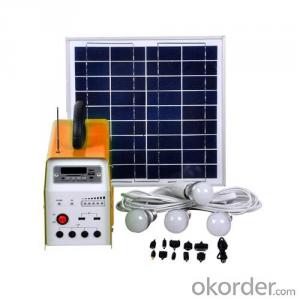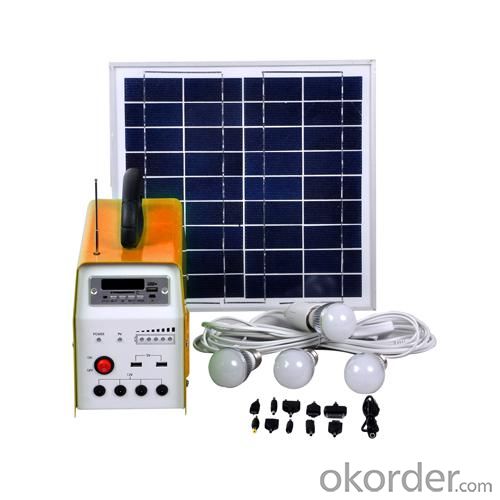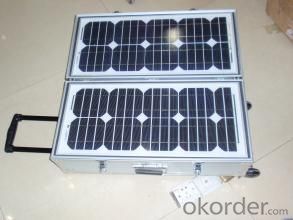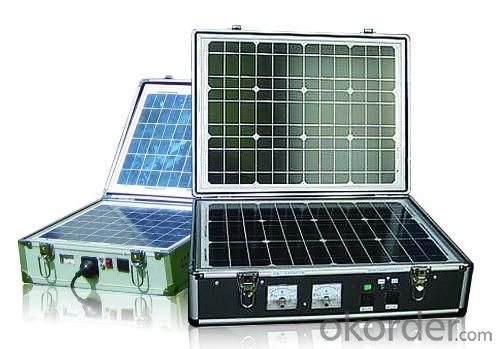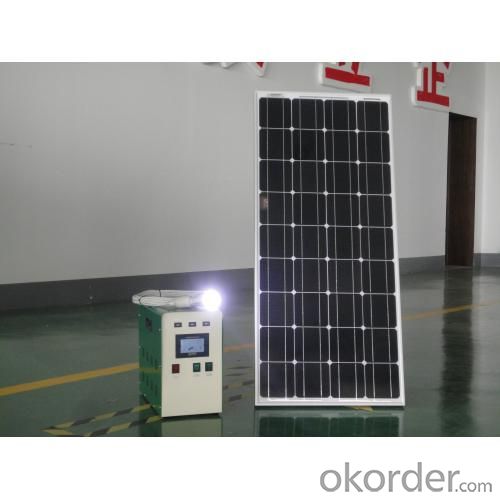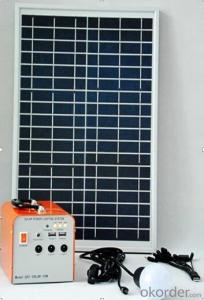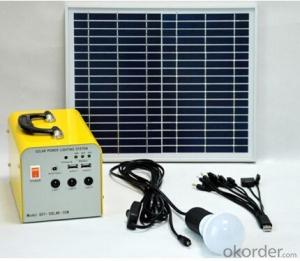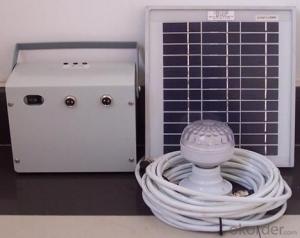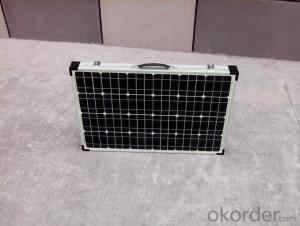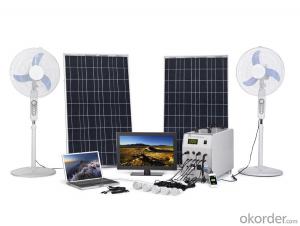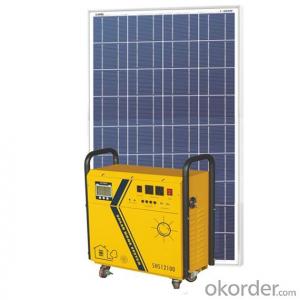Solar Energy Systems 772 - An-S100W Portable Solar System
- Loading Port:
- Shanghai
- Payment Terms:
- TT OR LC
- Min Order Qty:
- 0 set
- Supply Capability:
- 10000 set/month
OKorder Service Pledge
OKorder Financial Service
You Might Also Like
Specification
Description of Solar Portable System AN-S100W
Compatible portable solar power supply, also called solar mobile power, it includes: solar panel, charge controller, discharge controller, electric charge controller, inverter, outside enlarge capacity interface and battery, etc. Photovoltaic portable power supply can work in solar energy and ordinary power two modes, and can automatically switch. Photovoltaic portable power supply is used widely is the emergency relief, tourism, army, geological prospecting, archaeology, schools, hospitals, Banks, gas stations, comprehensive building, highway, substation, family camping or outdoor activities such as emergency power ideal power supply equipment.
Specifications of Solar Portable System AN-S100W
1. Solar Panel: 100W 18V
2. Battery: 12V60AH lead-acid battery
Input terminal: 1 DC input, 14.8V; 2 solar input terminal (+,-), 18V.
Output terminal: 8 output terminals, including:
1x USB output, 5V 1A;
5x DC outputs, 12V 1A;
2xAC220V outputs
Switch: 2pcs; left one for DC12V, right one for AC220V
Indication lamp: 2 pcs; Red one is for charging indication, Green one is for operating indication.
Accessories of Solar Portable System AN-S100W
1. 2pcs 3W led bulbs;
2. 1pc 5m connection wire between solar panel and cabinet;
3. 2pcs lamp holder with 3m wire;
4. 1pc AC charger
Technical Data of Solar Portable System AN-S100W
| Internal Package Size (cm) | 63*47*57 (panel extra) |
| Packing QTY | 1 |
| External Package Size (cm) | 63*47*57 (panel extra) |
IMages of Solar Portable System AN-S100W
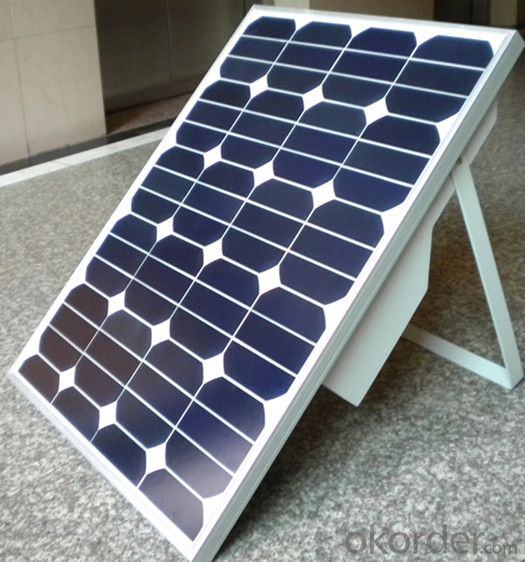
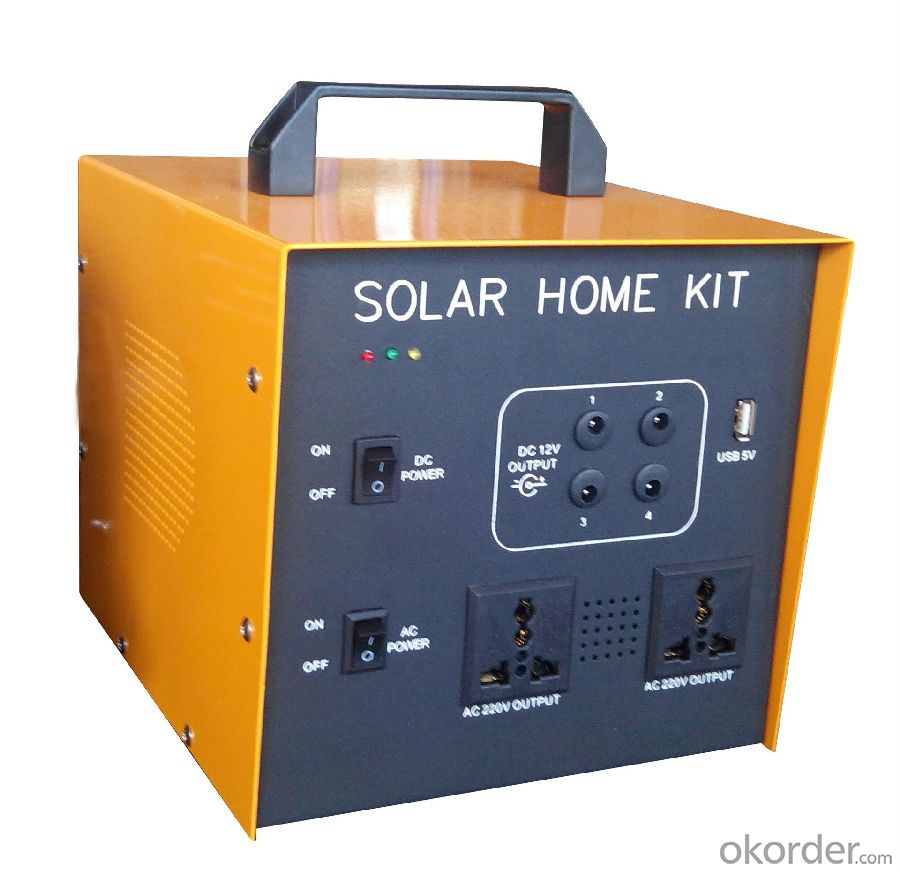
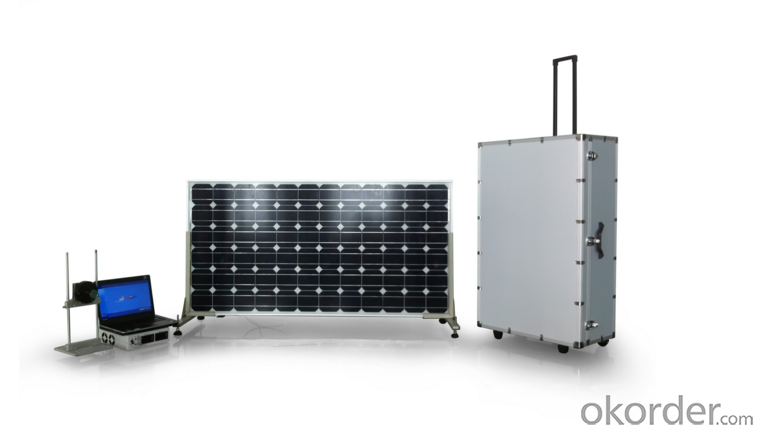
FAQ:
1. How long will my inquiry get response?
Your inquiry related to our products or prices will be replied within 24 hours.
2. Can I get professional service and suggestion?
Well-trained and experienced staffs to answer all your questions in fluent English.
3. Do you accept OEM or customized design?
OEM & ODM, any your customized lightings we can help you to design and put into product.
4. What if I need specific design?
Distributorship are offered for your unique design and some our current models.
- Q: Can solar energy systems be used in areas with limited roof space due to chimneys or vents?
- Yes, solar energy systems can still be used in areas with limited roof space due to chimneys or vents. In such cases, alternative installation options like ground-mounted solar panels, solar canopies, or solar pergolas can be considered. These options allow for the utilization of unused land or outdoor spaces to generate solar energy, making it possible to harness solar power even in areas with limited roof space.
- Q: Can solar energy systems be used for desalination?
- Yes, solar energy systems can be used for desalination. Solar-powered desalination plants use solar energy to power the desalination process, typically through the use of solar panels or solar thermal collectors. This renewable energy source can be harnessed to convert saltwater into fresh water, making it an environmentally friendly and sustainable solution for water scarcity in coastal and arid regions.
- Q: How does the efficiency of solar panels vary with different weather conditions?
- The efficiency of solar panels can vary significantly depending on the weather conditions. Solar panels convert sunlight into electricity, and therefore, their efficiency is directly affected by the amount of sunlight they receive. On a clear and sunny day, solar panels operate at their peak efficiency since they receive the maximum amount of sunlight. The direct sunlight allows for optimal conversion of solar energy into electricity, resulting in higher efficiency. However, during cloudy or overcast days, the efficiency of solar panels decreases. This is because clouds block a significant portion of the sunlight, reducing the amount of energy available for conversion. While solar panels can still generate electricity under cloudy conditions, their efficiency is considerably lower compared to sunny days. Temperature is another weather factor that affects solar panel efficiency. Contrary to popular belief, solar panels actually work more efficiently in cooler temperatures. As the temperature increases, the performance of solar cells decreases due to a phenomenon called the temperature coefficient. High temperatures reduce the voltage output of solar panels, leading to lower efficiency. Rain or snowfall can also impact the efficiency of solar panels, although the effect is relatively minimal. Rain can temporarily decrease the efficiency by reducing the amount of sunlight reaching the panels, but once the rain stops, they return to their normal efficiency. Snow, on the other hand, can cover the panels and prevent sunlight from reaching them, resulting in a temporary loss of efficiency until the snow is cleared. In summary, the efficiency of solar panels varies with different weather conditions. Clear and sunny days provide optimal conditions for maximum efficiency, while cloudy or overcast days result in decreased efficiency. Temperature fluctuations can also impact the performance of solar panels, with higher temperatures leading to lower efficiency. Rain and snow can temporarily reduce efficiency, but their overall impact is relatively minor.
- Q: Can solar energy systems be used in disaster relief efforts?
- Yes, solar energy systems can definitely be used in disaster relief efforts. These systems are portable, easy to set up, and can provide a reliable source of electricity in areas where the traditional power grid might be damaged or inaccessible. Solar energy systems can power medical equipment, communication devices, lighting, and other essential needs, thereby aiding relief operations and helping affected communities recover faster. Moreover, solar energy systems have the added advantage of being renewable and environmentally friendly, reducing reliance on fossil fuels during already challenging times.
- Q: Can solar energy systems be used in areas with limited access to solar energy warranties and guarantees?
- Yes, solar energy systems can still be used in areas with limited access to solar energy warranties and guarantees. While warranties and guarantees provide added assurance and protection, the viability of solar energy systems in such areas depends on factors like local climate conditions, available sunlight, and the efficiency of the system. Proper design, installation, and maintenance can help optimize energy production, making solar energy systems feasible even without extensive warranty coverage. Additionally, alternative financing options and community initiatives can help mitigate potential risks and barriers in areas with limited access to solar energy warranties and guarantees.
- Q: How does the orientation of solar panels affect their performance?
- The performance and efficiency of solar panels are greatly influenced by their orientation. To maximize the amount of sunlight they receive throughout the day, it is ideal for solar panels to directly face the sun. Typically, solar panels are installed on rooftops or mounted on frames, allowing them to be adjusted to the desired angle. The optimal orientation depends on factors such as the geographical location, season, and time of day. When solar panels are angled towards the sun, they are able to capture the maximum amount of sunlight, resulting in higher efficiency. Conversely, if their orientation is not proper, they will receive less sunlight and produce less electricity. In the northern hemisphere, solar panels are commonly installed facing south in order to capture the most sunlight throughout the day. Conversely, in the southern hemisphere, solar panels are oriented towards the north. This orientation allows the panels to receive sunlight for the longest duration during the day. The tilt angle of solar panels also affects their performance. Typically, the ideal tilt angle is equal to the latitude of the installation location. However, this angle can be adjusted to optimize energy production in different seasons. For example, in winter, the panels can be tilted at a steeper angle to capture more sunlight, while a shallower tilt angle in summer can prevent overheating. Improperly oriented solar panels can significantly reduce their performance, resulting in lower energy output. Therefore, it is crucial to consider the orientation and tilt angle when installing solar panels to ensure maximum efficiency and optimal energy production.
- Q: Can solar energy systems be used in educational settings for teaching purposes?
- Yes, solar energy systems can definitely be used in educational settings for teaching purposes. They provide hands-on learning experiences for students to understand the principles of renewable energy, sustainability, and environmental conservation. Solar energy systems can be integrated into science, technology, engineering, and math (STEM) curricula, allowing students to explore concepts such as photovoltaics, solar panels, energy conversion, and energy efficiency. Additionally, these systems offer practical applications that engage students in real-world problem-solving and empower them to become environmentally conscious individuals.
- Q: How do solar energy systems affect air pollution?
- Solar energy systems have a positive impact on air pollution as they generate electricity without emitting any harmful greenhouse gases or pollutants. By replacing traditional fossil fuel sources, solar energy helps to reduce air pollution, improve air quality, and mitigate climate change.
- Q: Can solar energy systems be installed on camping sites?
- Yes, solar energy systems can be installed on camping sites. In fact, solar panels are commonly used to power camping equipment such as lights, portable chargers, and even small appliances. They are a sustainable and convenient solution for accessing electricity in remote locations without the need for traditional power sources.
- Q: Can solar energy systems be used to power boats or yachts?
- Indeed, boats or yachts can utilize solar energy systems for their power needs. By installing solar panels on the boat's roof or deck, sunlight can be captured and converted into electricity. This electrical energy can then be utilized to operate various systems onboard, including lighting, navigation equipment, communication devices, refrigeration, and even propulsion systems. The size and capacity of the solar energy system will be determined by the boat or yacht's specific power requirements and the available installation space. Opting for solar-powered boats and yachts offers numerous advantages, including decreased reliance on fossil fuels, lowered operational expenses, quieter operation, and reduced carbon emissions. However, it is important to acknowledge that solar energy alone may not suffice for larger vessels or extended periods of low sunlight. In such instances, a hybrid system that combines solar energy with alternative power sources, like wind or diesel generators, may be more suitable.
Send your message to us
Solar Energy Systems 772 - An-S100W Portable Solar System
- Loading Port:
- Shanghai
- Payment Terms:
- TT OR LC
- Min Order Qty:
- 0 set
- Supply Capability:
- 10000 set/month
OKorder Service Pledge
OKorder Financial Service
Similar products
Hot products
Hot Searches
Related keywords
